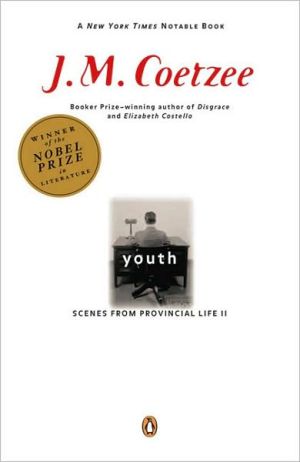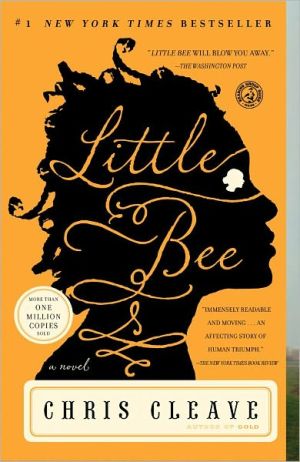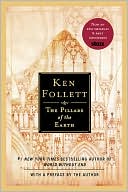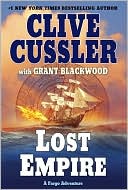Youth: Scenes from Provincial Life II
The second installment of J. M. Coetzee's fictionalized "memoir" explores a young man's struggle to experience life to its full intensity and transform it into art. The narrator of Youth has long been plotting an escape-from the stifling love of his overbearing mother, a father whose failures haunt him, and what he is sure is impending revolution in his native country of South Africa. Arriving at last in London in the 1960s, however, he finds neither poetry nor romance and instead begins a...
Search in google:
The second installment of J. M. Coetzee's fictionalized "memoir" explores a young man's struggle to experience life to its full intensity and transform it into art. The narrator of Youth has long been plotting an escape-from the stifling love of his overbearing mother, a father whose failures haunt him, and what he is sure is impending revolution in his native country of South Africa. Arriving at last in London in the 1960s, however, he finds neither poetry nor romance and instead begins a dark pilgrimage into adulthood. Youth is a remarkable portrait of a consciousness, isolated and adrift, turning in on itself, of a young man struggling to find his way in the world, written with tenderness and a fierce clarity.Book MagazineMost authors contemplating their younger days brim with a naive self-love. But early in the second volume of his wonderful autobiography, J.M. Coetzee, writing in the third person, gives a strikingly spare and unsentimental portrait of himself as he was at university. Studying mathematics and working four part-time jobs, he was proving something that only fledglings need to prove, "that each man is an island; that you don't need parents." The two-time Booker Prize winner chooses to describe himself physically at the least flattering moment possible: cheaply dressed and caught in a downpour, trudging along a South African road in the intermittent glare of headlights. The young Coetzee consoles himself that "being dull and odd-looking were part of a purgatory he must pass through in order to emerge, one day, into the light" of love and art. This agonized mix of vanity and despair, self-loathing and consolatory fantasy, all in a provincial setting, is so sharply accurate an evocation of late adolescence that one is reminded of Anton Chekhov's young characters: comic, pitiable and quite possibly brilliant, desperate to try their intelligence in a larger arena. For Coetzee, that cosmopolitan sphere was London, and his younger self arrives there from South Africa in the 1950s, with visions of poetry readings, love affairs and eventual fame. In fact, he gets a job writing computer programs for IBM and dwells in loneliness, consoling himself with the thought that as poets once stupefied themselves with absinthe and opium, he now submits to the rigors of "soul-destroying office work." His personal life is equally empty and uneventful. He is too self-centered, self-conscious andfearful to love anyone, although he does manage to make one girl pregnant and several unhappy. The effectiveness of this self-portrait comes from its absolutely unmediated quality. There are no apologies made, no reference to later moments of enlightenment or mitigation. Yet there is also no doubt that this gauche youngster is utterly remarkable. In the Reading Room of the British Museum, he delves into the obscure memoirs of South African pioneers and is fired with the idea of writing a fictional account as authentic in its details, but "whose response to the world around it will be alive." The question he asks himself in relation to this venture hints at the greatness of the writer he will become: "Where will he find the common knowledge of a bygone world, a knowledge too humble to know it is knowledge?" The ability to value what is humble, ordinary and therefore powerfully truthful is a quantum leap for the young man who so recently compared himself unfavorably to absinthe drinkers and libertines, and who searched for a mysterious beauty to be his muse. He notices that poetry and yearning seem to die away simultaneously, and fears that growing up means the extinction of all passions. He needn't have worried. He soon develops a surer sense of his own taste, and he becomes inspired after reading Samuel Beckett's Watt. With passions intact, he is cultivating a nascent sense of authentic self. One proof is that he suddenly finds, entering his third year in England, that he enjoys playing cricket with his fellow programmers. He had previously renounced the game "on the grounds that team sports were incompatible with the life of a poet," but discovers that he is surprisingly skillful at it. One of the few mentions of happiness, and the only use of the word "ecstasy," comes in writing about these lunchtime matches. And yet, his rare sense of well-being, of happy bachelorhood, comes when his sense of the world is growing more complex. His computer work turns out to support the British government's missile program, and he is often sent to a facility "ugly with the ugliness of a place that knows no one will look at it or care to look at it; perhaps with the ugliness of a place that knows, when war comes, it will be blown off the face of the earth." He recognizes himself as an enabler, an accomplice in the Cold War. His dilemma, initially a moral one, becomes an artistic one as well. For while he can imagine doing the right thing, he can't imagine any poetry arising out of it: "The right thing is boring," he thinks. Abruptly the reader is confronted with a cliff-hanger ending. Having been brought to the brink of artistic discovery, we feel Coetzee's youthful sense of impasse, his despair, his bafflement, his more adult self-loathing. He stands like a man on the edge of a great abyss, amid obscurity, fear, self-doubt and confusion. To discard what he has been told and act in accordance with his own true emotional responses to the world—to women, to cricket, to books, to political injustice—is something he is just learning to do. In that growing sense of authenticity lies the power that will carry him forward, to the passionately honest novels, including Life & Times of Michael K and Disgrace, that he will eventually write. But to see that bold and desperate leap forward, alas, we will have to wait for the next volume.
Youth\ In England girls pay no attention to him, perhaps because there still lingers about his person an air of colonial gaucherie, perhaps simply because his clothes are not right. When he is not dressed up in one of his IBM suits, he has only the grey flannels and green sports jacket he brought from him from Cape Town. The young men he sees in the trains and the streets, in contrast, wear narrow black trousers, pointed shoes, tight, boxlike jackets with many buttons. They also wear their hair long, hanging over their foreheads and ears, while he still has the short back and sides and the neat parting impressed on him in his childhood by country-town barbers and approved of by IBM. In the trains the eyes of girls slide over him or glaze with disdain.\ There is something not quite fair in his plight: he would protest if he only knew where and to whom. What kind of jobs do his rivals have that allow them to dress as they please? And why should he be compelled to follow fashion anyway? Do inner qualities count for nothing?\ The sensible thing would be to buy himself an outfit like theirs and wear it at weekends. But when he imagines dressing up in such clothes, clothes that seem to him not only alien to his character but Latin rather than English, he feels his resistance stiffening. He cannot do it: it would be like giving himself up to a charade, an act.\ London is full of beautiful girls. They come from all over the world: as au pairs, as language students, simply as tourists. They wear their hair in wings over their cheekbones; their eyes are dark-shadowed; they have an air of suave mystery. The most beautiful are the tall, honey-skinned Swedes; but the Italians, almond-eyed and petite, have their own allure. Italian lovemaking, he images, will be sharp and hot quite different from Swedish, which will be smiling and languorous. But will he ever get a chance to find out for himself? If he could ever pluck up the courage to speak to one of these beautiful foreigners, what would he say? Would it be a lie if he introduced himself as a mathematician rather than just a computer programmer? Would the attentions of a mathematician impress a girl from Europe, or would it be better to tell her that, despite his dull exterior, he is a poet?\ He carries a book of poetry around with him in his pocket, sometimes Holderlin, sometimes Rilke, sometimes Vallejo. In the trains he ostentatiously brings forth his book and absorbs himself in it. It is a test. Only an exceptional girl will appreciate what he is reading and recognize in him an exceptional spirit too. But none of the girls on the trains pay him any attention. That seems to be one of the first things girls learn when they arrive in England: to pay no attention to signals from men.\ What we call beauty is simply a first intimation of terror, Rilke tells him. We prostrate ourselves before beauty to thank it for disdaining to destroy us. Would they destroy him if he ventured too close, these beautiful creatures from other worlds, these angels, or would they find him too negligible for that?\ In a poetry magazine—Ambit perhaps, or Agenda—he finds an announcement for a weekly workshop run by the Poetry Society for the benefit of young, unpublished writers. He turns up at the advertised time and place wearing his black suit. The woman at the door inspects him suspiciously, demands his age. 'Twenty-one,' he says. It is a lie: he is twenty-two.\ Sitting around in leather armchairs, his fellow poets eye him, nod distantly. They seem to know one another; he is the only newcomer. They are younger than he, teenagers in fact, except for a middle-aged man with a limp who is something in the Poetry Society. They are younger than he, teenagers in fact, except for a middle-aged man with a limp who is something in the Poetry Society. They take turns to read out their latest poems. The poem he himself reads ends with the words 'the furious waves of my incontinence.' The man with the limp deems his word-choice unfortunate. To anyone who has worked in a hospital, he says, incontinence means urinary incontinence or worse.\ He turns up again he next week, and after the session has coffee with a girl who has read out a poem about the death of a friend in a car accident, a good poem in its way, quiet, unpretentious. When she is not writing poetry, the girl informs him, she is a student at King's College, London; she dresses with appropriate severity in dark skirt and black stockings. They arrange to meet again.\ They meet at Leicester Square on a Saturday afternoon. They had half agreed to go to a film; but as poets they have a duty to life at its fullest, so they repair to her room off Gower Street instead, where she allows him to undress her. He marvels at the shapeliness of her naked body, the ivory whiteness of her skin. Are all Englishwomen as beautiful when their clothes are off, he wonders?\ Naked they lie in each other's arms, but there is no warmth between them; and warmth, it becomes clear, will not grow. At last the girl withdraws, folds her arms across her breasts, pushes his hands away, shakes her head mutely.\ He could try to persuade her, induce her, seduce her; he might even succeed; but he lacks the spirit for it. She is not only a woman, after all, with a woman's intuitions, but an artist too. What he is trying to draw her into is not the real thing—she must know that.\ In silence they get dressed. 'I'm sorry,' she says. He shrugs. He is not cross. He does blame her. He is not without intuitions of his own. The verdict she has delivered on him would be his verdict too.\ After this episode he stops going to the Poetry Society. He has never felt welcome there anyway.\ He has no further luck with English girls. There are English girls enough at IBM, secretaries and punch operators, and opportunities to chat to them. But from them he feels a certain resistance, as if they are not sure who he is, what his motives might be, what he is doing in their country. He watches them with other men. Other men flirt with them in a jolly, coaxing English way. They respond to be flirted with, he can see that: they open like flowers. But flirting is not something he has learned to do. He is not even sure he approves of it. And anyhow, he cannot let it become known among the IBM girls that he is a poet. They would giggle among themselves, they would spread the story all over the building.
\ From Barnes & NobleJ. M. Coetzee continues the third-person memoir he began in his acclaimed Boyhood, as "John," the South African student, arrives in 1960s London. What he finds there is not exactly the artistic haven he was longing for, and his writing begins to suffer when he takes a job as a computer programmer in order to survive.\ \ \ \ \ Penelope MesicMost authors contemplating their younger days brim with a naive self-love. But early in the second volume of his wonderful autobiography, J.M. Coetzee, writing in the third person, gives a strikingly spare and unsentimental portrait of himself as he was at university. Studying mathematics and working four part-time jobs, he was proving something that only fledglings need to prove, "that each man is an island; that you don't need parents." The two-time Booker Prize winner chooses to describe himself physically at the least flattering moment possible: cheaply dressed and caught in a downpour, trudging along a South African road in the intermittent glare of headlights. The young Coetzee consoles himself that "being dull and odd-looking were part of a purgatory he must pass through in order to emerge, one day, into the light" of love and art. This agonized mix of vanity and despair, self-loathing and consolatory fantasy, all in a provincial setting, is so sharply accurate an evocation of late adolescence that one is reminded of Anton Chekhov's young characters: comic, pitiable and quite possibly brilliant, desperate to try their intelligence in a larger arena. \ \ For Coetzee, that cosmopolitan sphere was London, and his younger self arrives there from South Africa in the 1950s, with visions of poetry readings, love affairs and eventual fame. In fact, he gets a job writing computer programs for IBM and dwells in loneliness, consoling himself with the thought that as poets once stupefied themselves with absinthe and opium, he now submits to the rigors of "soul-destroying office work." His personal life is equally empty and uneventful. He is too self-centered, self-conscious andfearful to love anyone, although he does manage to make one girl pregnant and several unhappy. \ \ The effectiveness of this self-portrait comes from its absolutely unmediated quality. There are no apologies made, no reference to later moments of enlightenment or mitigation. Yet there is also no doubt that this gauche youngster is utterly remarkable. In the Reading Room of the British Museum, he delves into the obscure memoirs of South African pioneers and is fired with the idea of writing a fictional account as authentic in its details, but "whose response to the world around it will be alive." \ \ The question he asks himself in relation to this venture hints at the greatness of the writer he will become: "Where will he find the common knowledge of a bygone world, a knowledge too humble to know it is knowledge?" The ability to value what is humble, ordinary and therefore powerfully truthful is a quantum leap for the young man who so recently compared himself unfavorably to absinthe drinkers and libertines, and who searched for a mysterious beauty to be his muse. He notices that poetry and yearning seem to die away simultaneously, and fears that growing up means the extinction of all passions. \ \ He needn't have worried. He soon develops a surer sense of his own taste, and he becomes inspired after reading Samuel Beckett's Watt. With passions intact, he is cultivating a nascent sense of authentic self. One proof is that he suddenly finds, entering his third year in England, that he enjoys playing cricket with his fellow programmers. He had previously renounced the game "on the grounds that team sports were incompatible with the life of a poet," but discovers that he is surprisingly skillful at it. One of the few mentions of happiness, and the only use of the word "ecstasy," comes in writing about these lunchtime matches. \ \ And yet, his rare sense of well-being, of happy bachelorhood, comes when his sense of the world is growing more complex. His computer work turns out to support the British government's missile program, and he is often sent to a facility "ugly with the ugliness of a place that knows no one will look at it or care to look at it; perhaps with the ugliness of a place that knows, when war comes, it will be blown off the face of the earth." He recognizes himself as an enabler, an accomplice in the Cold War. \ \ His dilemma, initially a moral one, becomes an artistic one as well. For while he can imagine doing the right thing, he can't imagine any poetry arising out of it: "The right thing is boring," he thinks. Abruptly the reader is confronted with a cliff-hanger ending. Having been brought to the brink of artistic discovery, we feel Coetzee's youthful sense of impasse, his despair, his bafflement, his more adult self-loathing. He stands like a man on the edge of a great abyss, amid obscurity, fear, self-doubt and confusion. To discard what he has been told and act in accordance with his own true emotional responses to the world—to women, to cricket, to books, to political injustice—is something he is just learning to do. In that growing sense of authenticity lies the power that will carry him forward, to the passionately honest novels, including Life & Times of Michael K and Disgrace, that he will eventually write. But to see that bold and desperate leap forward, alas, we will have to wait for the next volume.\ \ \ \ Publishers WeeklyPicking up where his memoir Boyhood left off, Coetzee chronicles his coming of age in South Africa and London during the 1960s. Writing in the third person, Coetzee narrates the story of a young mathematics student named John who is hungry for excitement, adventure, and mystery. Increasingly dissatisfied with his inability to suck life's marrow in his native South Africa and also afraid of being conscripted into the army, John runs off to London to seek his fortune. He finds a job as a computer programmer, but his heart's great desire is to burn with the inner flame of the artist, so he spends his spare time writing poetry (he worships Ezra Pound) and searching in London bookshops for poetry journals. Along the way, he assuages his loneliness with sexual affairs, only to become lonelier when he realizes that he cannot offer these women a clue to the darkness that lies inside him. D.H. Lawrence meets Alan Paton in Coetzee's sometimes brilliant, sometimes tedious account of his sexual exploits, revolutionary fervor, and artistic evolution. This second memoir by the author of Waiting for the Barbarians and other popular novels is recommended for all libraries. [Previewed in Prepub Alert, LJ 31502.] Henry L. Carrigan Jr., Lancaster, PA Copyright 2002 Cahners Business Information.\ \ \ \ \ Library JournalPicking up where his memoir Boyhood left off, Coetzee chronicles his coming of age in South Africa and London during the 1960s. Writing in the third person, Coetzee narrates the story of a young mathematics student named John who is hungry for excitement, adventure, and mystery. Increasingly dissatisfied with his inability to suck life's marrow in his native South Africa and also afraid of being conscripted into the army, John runs off to London to seek his fortune. He finds a job as a computer programmer, but his heart's great desire is to burn with the inner flame of the artist, so he spends his spare time writing poetry (he worships Ezra Pound) and searching in London bookshops for poetry journals. Along the way, he assuages his loneliness with sexual affairs, only to become lonelier when he realizes that he cannot offer these women a clue to the darkness that lies inside him. D.H. Lawrence meets Alan Paton in Coetzee's sometimes brilliant, sometimes tedious account of his sexual exploits, revolutionary fervor, and artistic evolution. This second memoir by the author of Waiting for the Barbarians and other popular novels is recommended for all libraries. [Previewed in Prepub Alert, LJ 31502.] Henry L. Carrigan Jr., Lancaster, PA Copyright 2002 Cahners Business Information.\ \ \ \ \ Kirkus ReviewsContinuing the third-person narrative begun in Boyhood (1997), noted novelist Coetzee (Disgrace, 1999, etc.) pens another morose, yearning, revealing memoir. The author begins with his late adolescence in South Africa during the 1950s, a time marked for him by confused and confusing sexual initiations, a bookish devotion to the writings of Ezra Pound and other literary modernists, and growing self-awareness. “Wrapped up though he is in his private worries,” Coetzee writes of his earlier self, “he cannot fail to see that the country around him is in turmoil.” When his mathematics tutorial is interrupted by armed policemen putting down a strike, the young man resolves to leave the country for England. Desperate for work, he takes a job as a computer programmer at IBM while devoting his free time to writing a master’s thesis on the novels of Ford Madox Ford. The setting has changed, but his life remains much the same: a sequence of furtive gropings, longings from afar, and gnawing dissatisfactions. “He has come to London to do what is impossible in South Africa: to explore the depths,” Coetzee writes. “Without descending into the depths one cannot be an artist. But what exactly are the depths? He had thought that trudging down icy streets, his heart numb with loneliness, was the depths. But perhaps the real depths are different, and come in unexpected form.” Coetzee labors on, misery piling on misery, until he finally has had enough and leaves his IBM post, much to the astonishment of the careerists and teacart ladies who are his daily companions. Free for only a few weeks of bohemian glory, he finds that in order to escape deportation he must find another job, and so he again takes work asa programmer. There we leave him, grim in the certainty that he will never escape the soul-deadening work of crunching numbers and riding suburban trains. A fine portrait of the artist as a young drudge.\ \








